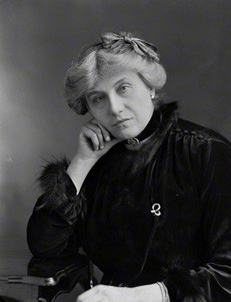Edith Lyttelton facts for kids
Quick facts for kids
Edith Lyttelton
|
|
|---|---|
 |
|
| Born |
Edith Sophy Balfour
4 April 1865 Saint Petersburg, Russian Empire
|
| Died | 2 September 1948 (aged 83) Westminster, London
|
| Occupation | Novelist, playwright, activist, spiritualist |
| Spouse(s) |
Hon. Alfred Lyttelton
(m. 1892; |
| Children | 3, including Oliver Lyttelton, 1st Viscount Chandos |
| Parent(s) | Archibald Balfour Sophia Weguelin |
Dame Edith Sophy Lyttelton (born Balfour; 4 April 1865 – 2 September 1948) was an important British writer and activist. She wrote novels and plays. She also worked to help people during World War I. Later in her life, she became interested in spiritualism.
Contents
About Edith Lyttelton
Edith Lyttelton was born in Saint Petersburg, Russia. Her father, Archibald Balfour, was a businessman from London. Her mother was Sophia Weguelin. Edith was taught at home. She became friends with a group of important people called "the Souls." This group included Arthur Balfour and Alfred Lyttelton. She married Alfred Lyttelton. They had two children who lived, including Oliver Lyttelton. Oliver later became a very important person in government.
Helping Others (Activism)
In 1900, Edith visited South Africa. She was very impressed by Alfred Milner, a British leader there. In 1901, she helped start the Victoria League. This group aimed to promote ideas about the British Empire. It brought together important women from different political groups. They all believed in the importance of the Empire. Edith was an Honorary Secretary for the League. She also supported a group that wanted to change trade rules.
Edith worked with many groups that helped people. She was on the board of the National Union of Women Workers. This group helped women who worked. She also led the Personal Service Association. This group helped people in London who did not have jobs. When World War I started, she helped create the War Refugees Committee. This committee helped people who had to leave their homes because of the war.
Later, she worked for the government. In 1917, she became a Deputy Director in the Ministry of Agriculture. This department dealt with farming. She also worked on a committee for women's jobs. From 1924 to 1931, she was a Vice-Chairman of a board that dealt with recycling. Edith also represented Britain at the League of Nations in Geneva several times. The League of Nations was an early international organization that tried to keep peace.
Her Interest in Spiritualism
After her husband died in 1913, Edith became interested in spiritualism. This is the belief that spirits of dead people can communicate with the living. She joined the Society for Psychical Research. This group studied unexplained mental abilities. She was even its president for a time. Her interest in spiritualism influenced her books. These included The Faculty of Communion (1925) and Our Superconscious Mind (1931).
Her Writings
Edith Lyttelton was a talented writer. She wrote a novel called The Sinclair Family (1926). She also wrote a book about her travels in Asia, called Travelling Days (1933). In 1917, she wrote a book about her late husband.
She wrote seven plays. Two of her plays, Warp and Woof and The Thumbscrew, were about unfair working conditions. These plays showed her fight against "sweated labour." This meant very low-paid, difficult work. She also translated a play by Edmond Rostand. She was good friends with famous writers like George Bernard Shaw. After 1918, she worked to create a national theatre in London. She was on the committee for the Shakespeare Memorial National Theatre.
Honours and Awards
In August 1917, King George V created the Order of the British Empire. Edith Lyttelton was one of the first people to receive an honour from this new order. She was named a Dame Commander of the Order (DBE). This was for her important work helping refugees. In 1929, she received an even higher honour. She was named a Dame Grand Cross of the Order of the British Empire (GBE). This was for her many public services.
Her Family Life
Edith Balfour married Alfred Lyttelton in Italy in 1892. She was his second wife. His first wife had died after only one year of marriage.
Edith and Alfred had three children:
- Oliver Lyttelton, 1st Viscount Chandos (born 1893, died 1972)
- Mary Frances Lyttelton (born 1895, died 1982)
- Anthony George Lyttelton (born 1900, died 1901)
Her husband, Alfred, died in 1913. Edith Lyttelton passed away in September 1948. She was 83 years old and died at her home in London.

